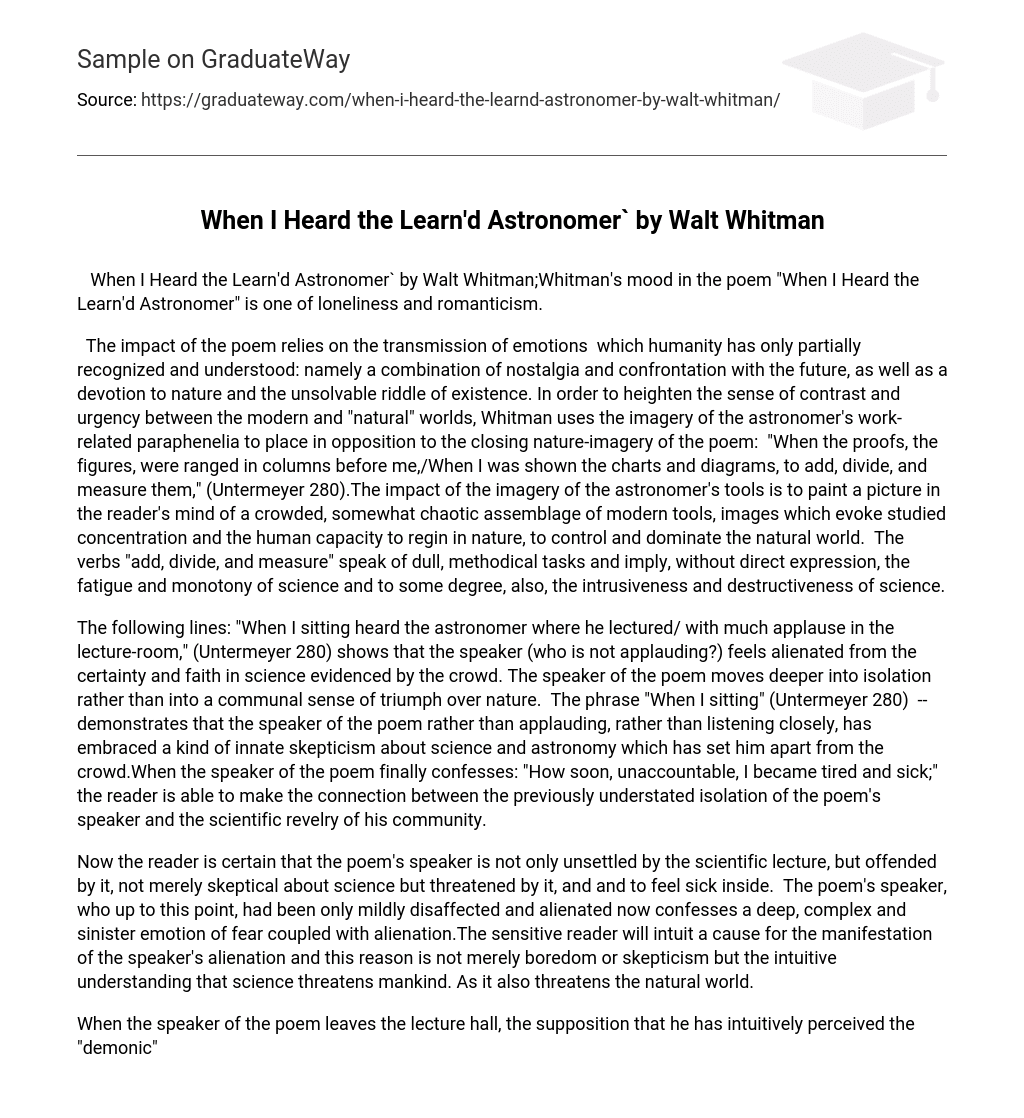The impact of the poem relies on the transmission of emotions that humanity has only partially recognized and understood: namely a combination of nostalgia and confrontation with the future, as well as a devotion to nature and the unsolvable riddle of existence. In order to heighten the sense of contrast and urgency between the modern and “natural” worlds, Whitman uses the imagery of the astronomer’s work-related paraphenelia to place in opposition to the closing nature-imagery of the poem: “When the proofs, the figures, were ranged in columns before me,/When I was shown the charts and diagrams, to add, divide, and measure them,” .The impact of the imagery of the astronomer’s tools is to paint a picture in the reader’s mind of a crowded, somewhat chaotic assemblage of modern tools, images which evoke studied concentration and the human capacity to regin in nature, to control and dominate the natural world. The verbs “add, divide, and measure” speak of dull, methodical tasks and imply, without direct expression, the fatigue and monotony of science and to some degree, also, the intrusiveness and destructiveness of science.
The following lines: “When I sitting heard the astronomer where he lectured/ with much applause in the lecture-room,” shows that the speaker (who is not applauding?) feels alienated from the certainty and faith in science evidenced by the crowd. The speaker of the poem moves deeper into isolation rather than into a communal sense of triumph over nature. The phrase “When I sitting” – demonstrates that the speaker of the poem rather than applauding, rather than listening closely, has embraced a kind of innate skepticism about science and astronomy which has set him apart from the crowd.When the speaker of the poem finally confesses: “How soon, unaccountable, I became tired and sick;” the reader is able to make the connection between the previously understated isolation of the poem’s speaker and the scientific revelry of his community.
Now the reader is certain that the poem’s speaker is not only unsettled by the scientific lecture, but offended by it, not merely skeptical about science but threatened by it, and and to feel sick inside. The poem’s speaker, who up to this point, had been only mildly disaffected and alienated now confesses a deep, complex and sinister emotion of fear coupled with alienation.The sensitive reader will intuit a cause for the manifestation of the speaker’s alienation and this reason is not merely boredom or skepticism but the intuitive understanding that science threatens mankind. As it also threatens the natural world.
When the speaker of the poem leaves the lecture hall, the supposition that he has intuitively perceived the “demonic” of destructive side of science is born out by the sudden shift in emotion from oppressive skepticism and alienation to harmony, purpose, and exaltation:Till rising and gliding out, I wander’d off by myself,In the mystical moist night-air, and from time to time,Look’d up in perfect silence at the stars.(Untermeyer 280) Here the words “gliding” “wander’d” “mystical” “perfect” and “silence” all pose a radicalopposition to the words associated with science and the lecture hall: “add” “divide”measure” and the like. The movement from a closed inside-space (the lecture hall) to the open space of the natural world under the starry sky is the most poignant and important gesture of the poem. The emotion of attached to physically leaving the lecture hall and returning to the natural world is one of liberation and individual harmony with the earth, spiritual exaltation and revelry in the mystery of the universe: all aspects which the reader may understand given the movement of the poem, in total, as being a direct antithesis to the goals and functions of science and scientific thought.
Work Cited
- Untermeyer, L. (Ed.). (1949).
- The Poetry and Prose of Walt Whitman. New York: Simon and Schuster.





